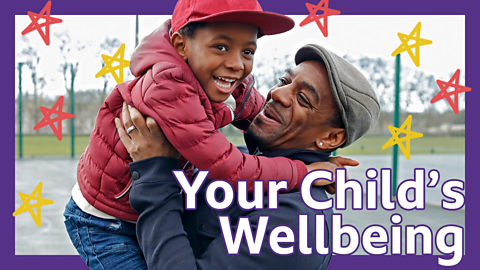To put it simply, yes!
Online gaming is not only fun, but it allows your child to learn valuable skills. The gaming world can open up opportunities for your child to socialise, get creative and even unlock new career paths.
We invited industry professionals Professor Sonia Livingstone and Games Designer Tom Stone to speak to Own It's gaming bootcamp for parents, to spill the beans on the positive social and cognitive impacts of gaming.
Own It's gaming bootcamp for parents brought together the parents of gamers, to discuss the world of video games and how to help your child safely explore it.
Giovanna Fletcher: Hello and welcome to BBC Own It's gaming bootcamp for parents. Today, me and my squad of gaming parents are going to get some pro intel on why gaming is so positive for our kids.
Title: Meet the pros
Giovanna Fletcher: Right, let's dive straight in. First up, we have Sonia Livingstone. She's a professor of social psychology and she's going to be explaining some of the social and cognitive benefits of gaming.
Sonia Livingstone: I would say that digital gaming and the chance to play online offers children lots of cognitive and social benefits. For many of them, it's a way to meet others and engage, and it's a chance to be imaginative. I think a lot of parents worry that their children are spending too much time gaming and what a lot of experts would say now is too much time isn't always the most important indicator. What matters more is the quality of the experience, what the child's getting from it - are they getting something positive or negative?
It's not always that the game is the cause of the problem. So one question for parents is to say, "Is my child gaming a lot because of other difficulties within the family, or difficulties at school?" Gaming is here to stay and there are lots of benefits, so we want it to have a positive impact on children.
Giovanna Fletcher: What did everyone think about that?
Marcus: I think the bit for me was about the indicators and how the length of time wasn't as important as the quality of their time spent, and are there indicators around that are being impacted? Like the sleep, the schoolwork.
Julia: The fact that it might be something else going on, why they are going to games, so there's wider issues because they can't necessarily articulate stuff that's going on.
Sonia: Gaming really became the main focus during lockdown because they couldn't meet their friends, they didn't have the routine of their schools, and that's when gaming became the main focus.
Giovanna Fletcher: Okay, so next up, we have Tom Stone to tell us about the potential career opportunities within the gaming industry.
Tom Stone: I joined the video games industry in 1993. I joined Electronic Arts. I left Electronic Arts after eight years, and started the LEGO gaming franchise. If you are a keen gamer and you have explored games, I think very naturally you would join the QA group, and your job is essentially to find defects within the game and from there you can springboard into games marketing, games development, games publishing, you know, games design. I mean there's a whole raft of different opportunities and careers available.
Giovanna Fletcher: So, what do we think about what Tom had to say?
Sonia: I think it's quite nice to know that it's not just one or two, like, sort of jobs. There's like a wide variety and you don't need to have a masters degree or nothing like that if you have a passion for it, and you find you're good at it, like, you can go down that path.
Marcus: Clearly, there's opportunities there, as Tom has said. So you know, with my children learning coding, as yours are probably in school, is really for them to kind of, you know, take the opportunity, if they want to pursue it.
Julia: Yeah, and I think it can only be a good thing, because it opens up other opportunities which weren't there previously, just in terms of it just being a bit more accessible to a wide range of kids who thought, well, I'm not really academic, I'm not bookish, I can't do that. But I love doing this game. The thought that they could make money doing what they love is actually quite, it's a pretty cool thing, really.
Giovanna Fletcher: So after today, how are we feeling about gaming? Are we feeling more positive towards it? Do we feel like we've learnt more?
Marcus: Today I really feel like we've discussed and found that there's actually lots of positives from it. There is a lot of options for us, as parents, we need to take forward.
Giovanna: Thank you parent squad, that was great!
Parent squad: Thank you!
Giovanna Fletcher: Well, I don't know about you guys, but that has certainly opened my eyes to the world of gaming, and for more information about how your child can safely own it online, go to the BBC Own It website!
What skills does gaming teach?
Video games require a level of technical skills such as:
Precision
Accuracy
Time management
Business
Finance
Communication
Public speaking
Your child is solving problems and completing data analysis on a daily basis - and they probably don't even realise it.
2/3 of 8-17 year olds felt they had learnt job skills through gaming.
Most jobs now require a high level of tech skills and experience. So maybe, video gaming within a happy and safe environment can be a positive thing?
Films created in consultation with Childnet.
All statistics have been provided from a study conducted by UK Safer Internet Centre.
Why not check out some of the other episodes in the series?
What games are your kids playing online? discussing how kids are gaming.
Originally published as part of Own It - the BBC's place children can find help, support and advice on how to live their best and safest online life.
Check out the CBBC Gaming Hub with your child to explore articles all about gaming, cool clips, and even games to play!

More from BBC Bitesize Parents' Toolkit…
Parents' Toolkit
Fun activities, real-life stories, wellbeing support and loads of helpful advice - we're here for you and your child.
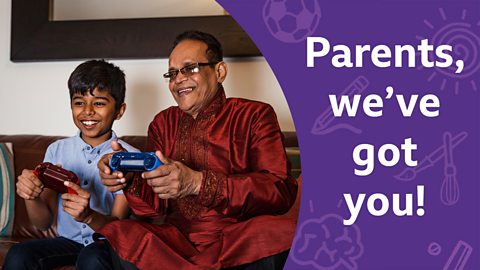
How technology has made parenting more difficult and how to navigate it
BBC Bitesize Parents' Toolkit looks at how widespread access to the internet for our children is causing clashes at home, with negative and positive aspects.
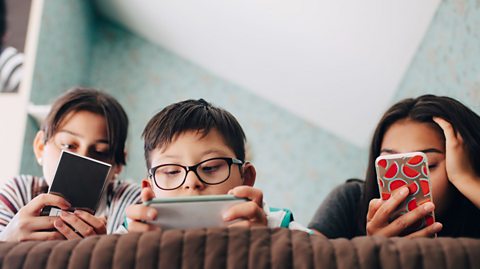
Dear Parents' Toolkit... How much screen time is too much?
Parents across the UK share their thoughts on screens and internet safety. Should I use them in parenting? What is 'screen guilt'? And how do I get my child away from them?
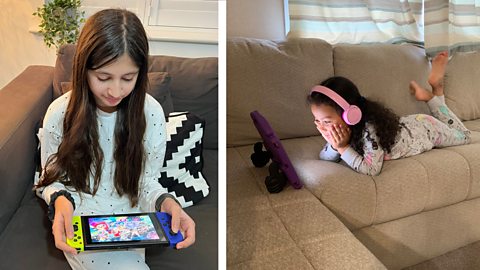
Seven ways to get your kids outdoors
Getting your teens out of the house and into nature can boost their health and wellbeing. Tips on how to do it from parents who are outdoors enthusiasts.
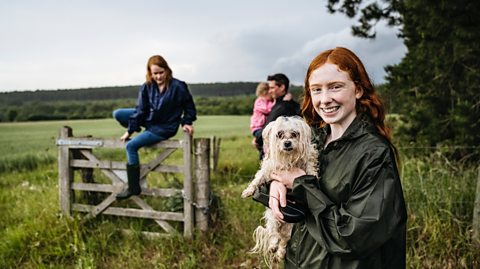
How to help your family enjoy a screen free week
BBC Bitesize Parents’ Toolkit takes a look at the ways you can take part in a screen-free week and how it can benefit you and your children.

